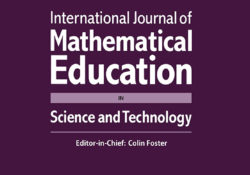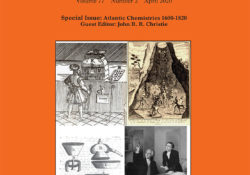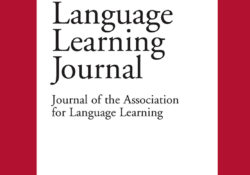tandfonline.com har udgivet en rapport under søgningen “Teacher Education Mathematics”: ABSTRACT ABSTRACT This article interprets a recently recovered manuscript, Tratado de astronomía y la reformaçión del tiempo, composed by Antonio Sánchez in New Granada c.1696, in the context of the Spanish and Renaissance cosmographies. Sánchez’s Tratado proposes a spherical astronomy, in which celestial bodies – including comets — move in orbs containing pyramidal knots that explain the changing speed observed in the motion of planets. From this astronomy and following the peninsular style of repertorios, Sánchez derives two major conclusions: the corrected length of the solar year and a revised birth date of Jesus. Taking as center of reference Vélez, where Sánchez was based, these claims led to conclusions in domains ranging from calendric astronomy to eschatology, including the incorporation… Continue Reading →
Like this:
Like Loading...
tandfonline.com har udgivet en rapport under søgningen “Teacher Education Mathematics”: ABSTRACT ABSTRACT Concerns over the supply of highly-skilled (HS) science, technology, engineering and maths (STEM) workers are well established and have been a feature of policy discourse in the UK for more than 50 years. Since the 2016 referendum on leaving the European Union, these concerns have been exacerbated by uncertainty about the movement of labour between UK and Europe. More recently, the COVID-19 pandemic has highlighted the importance of STEM skills in a wide range of areas. However, despite continued government investment in initiatives to address these concerns, the evidence base for shortages is neither well-established nor compatible with economic theories of labour supply. In order to fill a gap in the current evidence, we report on a unique analysis… Continue Reading →
Like this:
Like Loading...
eric.ed.gov har udgivet: This study tried to explore the degree of representation of math textbooks for grades (4-8) in the Kingdom of Saudi Arabia concerning the key concepts, shape, and levels of questions used in the TIMSS test. The study population of this study includes both students and teachers from fourth grade to eighth grade. The goal of this study was associated with six key concepts including numbers and their operations, algebra, geometry, measurement, statistics and probability, and a pro-rata. The researcher analyzed the questions and exercises used in the math textbooks to identify their effectiveness and efficiency. In addition, the researcher also calculated the percentages, the levels, and the shape for each key concept. The results of the study were organized in frequency tables. In the light of those… Continue Reading →
Like this:
Like Loading...
tandfonline.com har udgivet en rapport under søgningen “Teacher Education Mathematics”: ABSTRACT ABSTRACT The Netherlands are quite unique in that the Dutch have always learned various foreign languages. Until 1940, French was the most important foreign language. Between roughly 1870 and 1970, Dutch learners in grammar schools and higher secondary schools were even obliged to learn three foreign languages: French, German and English. Since 1970, however, English has become the first foreign language, and proficiency in French and German has declined. As for methodology, Dutch foreign language teaching/learning (FLT) has always taken a practical stand, in which the question ‘does it work?’ is paramount. This article provides an overview of the developments that have characterised Dutch FLT from approximately 1500 to the present day. Link til kilde
Like this:
Like Loading...

tandfonline.com har udgivet en rapport under søgningen “Teacher Education Mathematics”: ABSTRACT ABSTRACT In this paper, we examine the national curricula for primary mathematics for each of the four constituent nations of the United Kingdom (England, Northern Ireland, Scotland and Wales) for the estimation-related opportunities they offer children. Framed against four conceptually and procedurally different forms of estimation (computational, measurement, quantity and number line), the analyses indicate that computational estimation and measurement estimation were addressed in all four curricula, albeit from a skills-acquisition perspective, with only the Scottish offering any meaningful justification for their inclusion. The process of rounding, absent in the Northern Ireland curriculum, was presented as an explicit learning objective in the English, Scottish and Welsh curricula, although it was only the Scottish that made explicit the connections between… Continue Reading →
Like this:
Like Loading...



